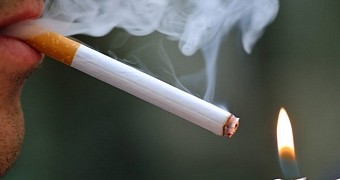According to researchers with the Ohio State University in the US, people who smoke risk having serious trouble healing, should they be wounded. Besides, they are more likely to witness their injuries getting infected.
In a paper in the Journal of Wound, Ostomy and Continence Nursing, the specialists explain that this is because the chemicals found in cigarette smoke not only reduce blood flow to a wound but also toy with the body's natural defense mechanisms.
How smoking prevents wounds from healing
The Ohio State University researchers explain that smoking affects wound healing in more than one way. To begin with, evidence indicates that the chemicals found in cigarette smoke, and especially carbon monoxide, cyanide and nicotine, reduce blood flow.
The specialists go on to detail that, the less blood reaches the site of an injury, the harder it is for the cells in that particular region of the body to get the oxygen they need to stay alive and thrive. Apparently, just one cigarette is enough to considerably reduce blood and oxygen flow to tissues, Science Daily informs.
What's more, it appears that, in the case of people who smoke, the body's natural defense mechanisms have trouble fighting off potential threats. As a result, a wound that is already having a tough time healing because of reduced blood flow can easily get infected.
“Chemicals like carbon monoxide reduce blood flow to the wound and prevent skin's natural anti-inflammatory and anti-bacterial mechanisms – so it's a perfect chemical storm which makes wounds more likely to get infected, and less likely to heal,” says researcher Jodi McDaniel.
This is a serious threat to public health
It is estimated that, each and every year, non-healing wounds such as venous leg ulcers, diabetic foot ulcers, and pressure ulcers plague some 6.5 million people in the US. The annual costs associated with trying to treat these conditions amount to a whopping $25 billion (nearly €22 billion).
Specialist Jodi McDaniel and colleagues believe that, were doctors to try and talk some of these people into giving up smoking, it might be possible to somewhat cut the costs associated with dealing with these health complications and help folks get back on their feet.
“It's stunning that more attention hasn't been paid to this issue,” said Jodi McDaniel. “Clinicians can help start a dialogue that will emphasize the importance of tobacco cessation and potentially improve healing outcomes,” added colleague Kristine Browning.

 14 DAY TRIAL //
14 DAY TRIAL //